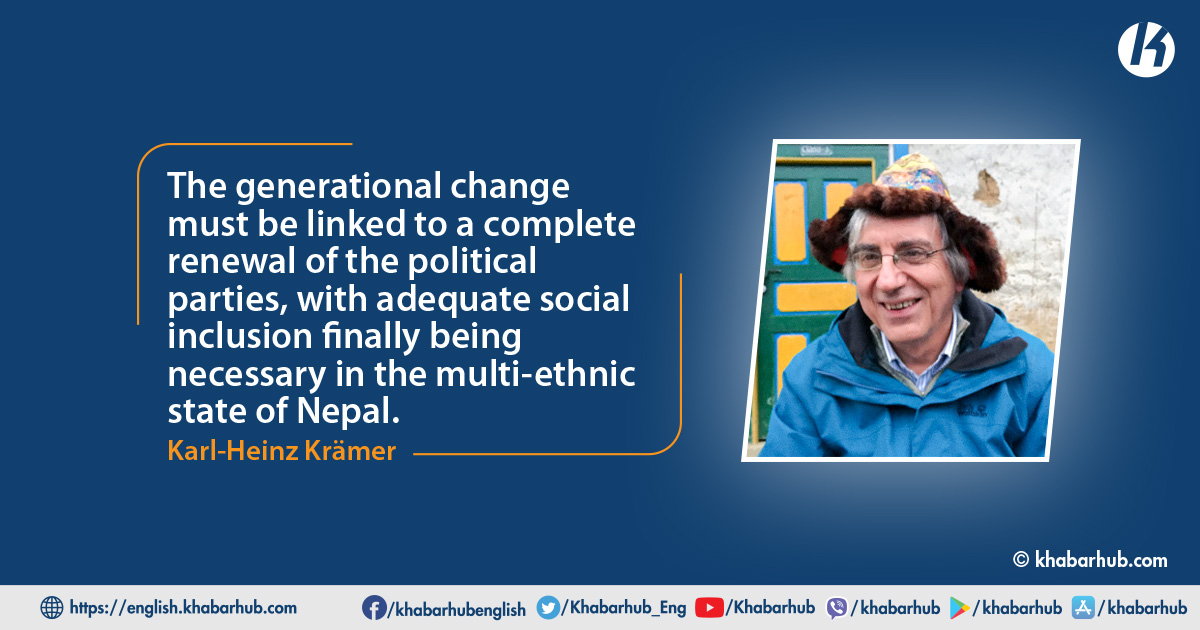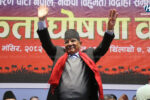The real plight of Nepali democracy, which is particularly evident in the current crisis, has much to do with the lack of democratic structures in the parties.
Those who make it to the top of the party are hard to get out of it, no matter what they are guilty of and how miserably they fail in their duties.
The top politicians largely decide on the composition of the two highest party bodies and make sure that the share of their clientele is maintained there.
This is the same for all parties. It also contributes to the fact that at least the upper levels of the party are far from reflecting the composition of society: In extremely patriarchal Nepal, men dominate quite predominantly, especially from the Bahun and Chhetri circles.
Given the aforementioned party structures, this is not expected to change quickly.
Another important aspect is the inability to realize justice in relation to past crimes or misconduct, or strictly speaking, the denial of such justice.
The current crisis is in many ways a repeat of the one in 2002. KP Oli is particularly responsible today, but the other top politicians of the major parties also bear a large share of the blame.
Again, all parties are involved. If one takes the massive international call for justice for the victims of the Maoist insurgency alone, it is clear that many of today’s top politicians had to bear responsibility at the time, whether as direct participants like the former Maoist leaders or as state politicians responsible for the deployment and conduct of the security forces.
Only two examples should be mentioned here. Pushpa Kamal Dahal declared some time ago that as the then head of the Maoists he was responsible for the death of around 5,000 people.
But that does not stop him from continuing to aspire to leading state and party offices or even to answer to a court of law, which would have been a logical consequence of his testimony.
A second example is Sher Bahadur Deuba, the NC leader and four-time prime minister, who is now keen to become prime minister again.
He paved the way for the Maoist insurgency when, as prime minister in 1995, he militantly but unsuccessfully tried to suppress the initial organization of the Maoist party in mid-western Nepal.
In early 1996, he refused to even discuss the Maoists’ 40 demands, although most of them were entirely rational and many concerned the state policy prescriptions of the then constitution, which the government paid scant attention to.
In 2001, Deuba then pushed through the mobilization of the army against the Maoists, which led to a complete escalation of the conflict.
That he then called on King Gyanendra to dissolve parliament in 2002, dealing a death blow to the 1990 political system, is also worth noting given Oli’s current misbehavior. Finally, overall, he caused a split in his Nepali Congress in 2002.
The elected representatives of the people were only allowed to nod off what this small elite circle had agreed among themselves. And this circle continues to decide the country’s politics.
The current crisis is in many ways a repeat of the one in 2002. KP Oli is particularly responsible today, but the other top politicians of the major parties also bear a large share of the blame.
Preconditions for new elections
Nepal’s politicians are often very difficult to assess, as their behavior is not based on a consolidated political culture.
The aforementioned fact that all of Nepal’s political parties lack basic democratic structures is the reason why none of the parties is capable of regular renewal and further development.
At the top of the parties are ageing men, predominantly Bahuns, who are endowed with an incredible amount of power.
Some of these ageing men are in turn at the head of intra-party factions. All the important functions at the subsequent party levels are not allocated according to competence through free and independent elections within the party, but rather from above according to a kind of favoritism system, which in Nepal is often referred to as the aphno manche system, whereby membership in one of the factions mentioned is the decisive criterion.
The result is that, firstly, the men at the top are allowed to fail as often as they like and, secondly, talented and possibly much more competent younger people are at best given a chance of promotion if one of the old men at the top dies off.
So what option do the voters have if there are indeed new elections in the near future, as it increasingly looks like there will be?
In the next elections, too, voters will only be allowed to choose which of the old politicians, some of whom have failed repeatedly (Deuba four times, Oli and Dahal twice each, Nepal and Khanal once each), they want at the helm of the government.
There will be no chance of fundamental renewal in these elections either. The undemocratic party structures alone ensure this.
The people of Nepal do not want revolutions that only catapult a few other men into positions of power but do not change anything in their living situation.
Those who have failed in the past, have proved that they cannot do it and should make way for younger people. Thus, the current system is more democracy than an oligarchy.
In 2008, when the current political system was to be established by means of a new constitution, the aim was that all social groups in the country should participate and be able to voice their concerns.
In the end, however, the 2015 constitution was the work of a small circle of male politicians who had been dominant for years.
The elected representatives of the people were only allowed to nod off what this small elite circle had agreed among themselves. And this circle continues to decide the country’s politics.
Nepal is a multi-ethnic, multi-religious, multi-cultural and multi-lingual state where women, Dalits and members of numerous ethnic groups are made second or third class citizens and are discriminated against and excluded in most areas of public life.
In 2008, aspects such as inclusion and equality of all citizens had been at the forefront of the renewal policy guidelines.
But for women and Dalits, for example, hardly anything has changed. They are still, or perhaps even more than before, exposed to violence and oppression without the state taking care of them, not even legally. At best, pseudo-rules have been enacted for their political participation.
Secularism and federalism were other important cornerstones of the renewal. Neither has been implemented yet. Especially recently, secularism has been questioned more often again.
Demands for a return to the Hindu state, i.e. the backbone of all social inequality in Nepal, come not only from the die-hards, such as the RPP but also from the ranks of the Nepali Congress, whose founding president BP Koirala had already declared in the run-up to the 1959 elections that he wanted to ensure that the idol of Pashupatinath and the crown of the Hindu king were put in the Nepali museum.
These are just a few examples of what many people care about, what they expect and hope for from the state and their elected representatives.
The people of Nepal do not want revolutions that only catapult a few other men into positions of power but do not change anything in their living situation.
They want rational life security, development and improvement of infrastructure geared to their needs, and free and good quality education financed by the state for their children in adequate school buildings that are not still in ruins six years after the severe earthquake; the introduction of compulsory education is just as important in this context as better training and pay for teachers.
The people want a nationwide affordable health system with universal health insurance to cover them if they fall seriously ill.
After all, they cannot, like the country’s leaders, be treated abroad at state expense when they fall ill.
The people want the government to protect nature to a sufficient extent, to fight and prevent forest fires, so that the tremendous exhaust fumes, which are currently prevalent again and could become even more serious in the future due to climate change, do not damage their health and shorten their life expectancy.
The people, as far as they were affected during the time of the Maoist insurgency, want the state to finally provide justice for the victims and to punish the perpetrators of the past appropriately.
People want their basic human rights to be respected and upheld, regardless of gender, ethnicity, religion and culture.
If the answer to this question is yes, one should discuss how Nepal can get on a better democratic path. However, it should not be enough to replace the old failed leaders with a new generation.
These are just a few examples of what many people care about, what they expect and hope for from the state and their elected representatives.
Those who now head the state and the political parties have largely failed in this regard. It makes no sense for these politicians to stand for election again.
This would mean: Business as usual, at best with slightly mixed top positions. In the long run, this would destroy the already weak democracy.
Against this background, it is legitimate to ask whether the current party political leaders are not mainly responsible for the permanent crisis and the constant setbacks of Nepal’s democracy.
If the answer to this question is yes, one should discuss how Nepal can get on a better democratic path. However, it should not be enough to replace the old failed leaders with a new generation.
This generational change must be linked to a complete renewal of the political parties, with adequate social inclusion finally being necessary in the multi-ethnic state of Nepal.









Comment